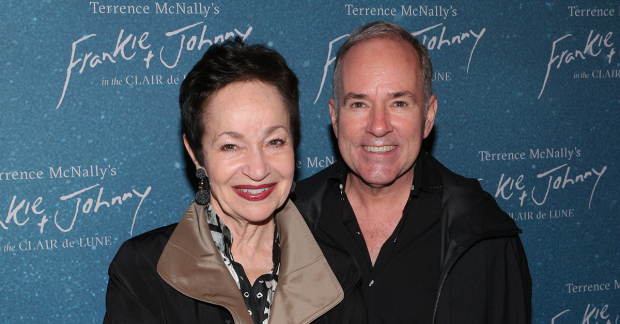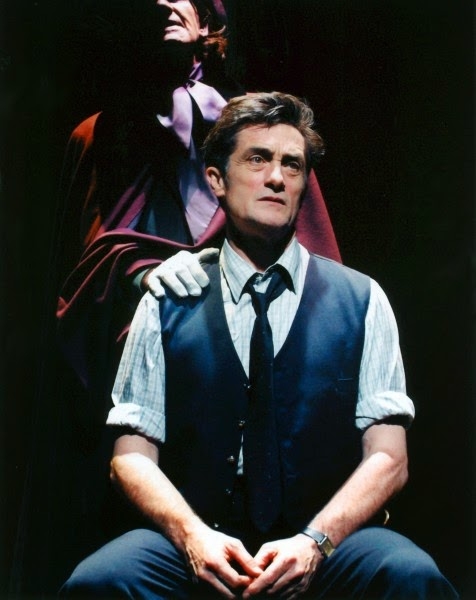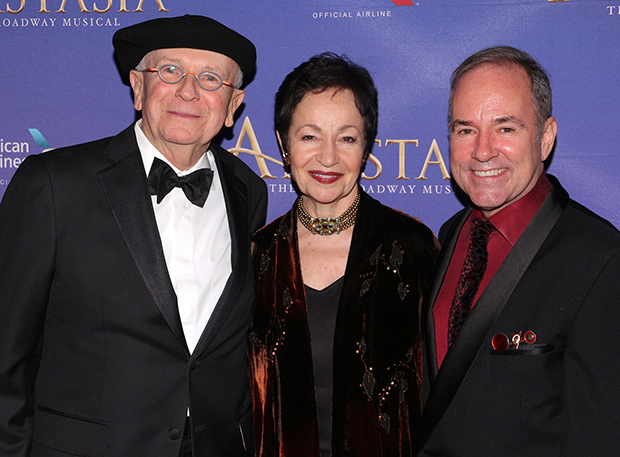Interview: Lynn Ahrens and Stephen Flaherty Rediscover Their Man of No Importance
John Doyle directs this rarely seen musical at Classic Stage Company, with a cast led by Jim Parsons.
We all know Ragtime, we all know Once on This Island, we all know Seussical. This fall, A Man of No Importance, that rarely seen gem of a musical from songwriters Lynn Ahrens and Stephen Flaherty and book writer Terrence McNally, will take the stage at Classic Stage Company for its first-ever major New York City revival.
Inspired by the Albert Finney movie of the same title — and telling the story of a closeted Irish bus driver and his amateur theater group — A Man of No Importance was the trio's much smaller follow-up to Ragtime, running briefly in the fall of 2002 at the Mitzi E. Newhouse Theater at Lincoln Center. Roger Rees, he of Nicholas Nickleby and Cheers and The West Wing, took on the leading role back then in Joe Mantello's production; in John Doyle's new staging, the character of Alfie Byrne is essayed by a stage and screen vet of a similar nature, Jim Parsons.
Classic Stage Company's production is a bittersweet experience for Ahrens and Flaherty. They're loving the experience of rediscovering the show, but they're doing it without McNally, who died of Covid in March 2020. Still, they feel his presence every day as they work on the project, and he was there, they say, sitting on their shoulders when Ahrens first mentioned the show to Doyle way back in the worst days of the pandemic.

(© David Gordon)
This conversation has been condensed and edited for clarity.
How did this revival of A Man of No Importance come to be?
Lynn Ahrens: I'm a member of the publications committee for the Dramatists Guild, and they put out a lovely magazine. When Terrence passed away, they wanted to do a big issue honoring him, and Gretchen Cryer and I were asked to be co-guest editors. So we were thinking of ideas, and we decided to ask all of his friends to write a little blurb about Terrence in remembrance. I got my list of people to call, and one of them was John Doyle. I got in touch with him and he said he'd love to — this is by email — and he also asked "do you have anything I might like to direct?" I emailed back A Man of No Importance. It was like Terrence was sitting on my shoulders whispering in my ear. John read it, he listened to the CD, and he got back to me a month later and said he loved it and empathized with it, and that's how it came to be. And I feel like Terrence is in the last row of the theater trying to keep an eye on the production as it evolves.
Was Terrence the instigator of the musical to begin with?
Stephen Flaherty: Yes, he was. Of the three musicals we've done with Terrence, this was the one that had the special place in his heart. We had a wonderful experience working on Ragtime together, and as you know, that original production of Ragtime was so opulent: there were 52 on stage, 28 in the pit, and all the bells and whistles. Terrence wanted to work with us again and we wanted to work with him too, and he told us to think of something on the exact opposite end of the spectrum, something small and intimate. He asked me what kind of music I'd like to work on, and, as you may know, in Ragtime, the Irish folk were the villains, and we ended up cutting virtually all of their score. So I said that something Irish might be worth pursuing, but I didn't want to do a period piece. He had seen the movie A Man of No Importance with Albert Finney, and he said it was about people making theater, and it's very humble. We looked at it and loved what it had to say.
Lynn: But it was a hard thing to figure out, because Alfie Byrne, in particular, has such a huge secret he's containing and had nobody to talk to. He couldn't be himself with anybody.
Stephen: I just kept saying, "Terrence, he's so secretive and he has no scene partner to reveal himself to. He keeps his cards so close to the chest. How can I get music out of him? Who would he reveal this to?"
Lynn: And finally, Terrence solved the problem, after about a year.
Stephen: Oscar Wilde is mentioned in the film — he does not appear in the film. But Terrence made him a character and he's the scene partner I had been asking for. Immediately, Lynn and I were able to write a song called "Man in the Mirror." When we played it for Terrence, he was so excited. This is interesting about Terrence: he never asked us to play a song a second time, ever. We would present a new song and he would say "Mmm," but never, "Play it again." "Man in the Mirror" is the first and only time he asked us to play it again, and he was so excited. From there, the music just poured out.
What is it like to see this show take shape again?
Lynn: What I'm finding is that there are a lot of songs that are surprising me. "Princess" is a new favorite. There's a scene in "Confession" that is my new favorite. "The Cuddles Mary Gave" is a new favorite. It's like, "Where did these songs come from?" As an author, you get to reexperience it in the moment, and you think, "Wow, that's beautiful!"
Stephen: There's a song in Act 2 called "Confusing Times," and you won't know it because we did not record all of the songs on the original cast album. It's sung by Carney, who is basically trying to say what is appropriate and what is not appropriate to read or see on a stage. And the lyric feels so contemporary and chilling with the idea of people trying to ban books now from libraries. The show takes place in 1964, but it seems like it's ringing a very loud bell right now.

(© Paul Kolnik
This cast, led by Jim Parsons and Mare Winningham, sounds so perfect from top to bottom.
Lynn: It is perfect casting, and it's such different casting than the cast we had originally, who we thought were cast perfectly. Jim has a gentleness and almost a boyish innocence to him that works so beautifully for the character. It's interesting because he's famous for a comedy, a sitcom, but he somehow embodies the character who is not yet fully alive and is so repressed in the most wonderful way. I can't take my eyes off him. And we did not know if he could sing, but he has a lovely, light voice and he's doing the songs so beautifully. And Mare Winningham just is Lilly Byrne. She just is. There's not a dishonest bone in that woman's body.
Stephen: And she's such a generous actor. I was aware of her more recently because of Girl From the North Country, which I had some chums in, so I'd seen it at the Public and for all three of its Broadway openings. Each time I saw her, the performance was different. It was constantly alive and different thing were happening every night. I don't know how she does it? I was saying my prayers that she would say yes for this.
Lynn: And I want to talk about A.J. He's amazing.
Stephen: He's amazing.
Lynn: A.J. Shively can do no wrong. He's so full of ideas. John Doyle will say, "What about this?" and he totally changes. He's so fluid and comfortable in his body and himself. He's absolutely stunning. And I want to give a little shout out to Thom Sesma, who we've worked with only once before, but we've known him for years. He plays Carney, and he's hilarious and fierce, and he also plays Oscar Wilde, and it's so beautiful the way he brings a change to both of the characters. I'm just in love with him.
Stephen: And I have to mention Shereen Ahmed, who is our Adele Rice, the mystery woman who appears on Alfie's bus and changes his life. She's somebody that I had heard about but was not aware of, probably because she was doing Eliza Doolittle on the road in My Fair Lady, and she's ethereal. She's got such a presence. I haven't seen a young performer have that level of charisma in a very long time.
What is it like for you two to simultaneously be safeguarding the legacy of this show you and Terrence wrote, while also allowing John and his actors to do what they need to do to build a production?
Lynn: We take it really seriously, because we are the guardians of the flame on these three shows. Of course, Tom Kirdahy represents Terrence and he is very present in rehearsals, or will send somebody now and then.
Stephen: It's important to remember that Terrence had a really good and healthy relationship with John Doyle. John directed Terrence's final play, Fire and Air, at Classic Stage Company in this very space, and John also did editorial work and focusing on The Visit, which, for nine years, I believe, had two acts and was two hours and 45-minutes, but when John directed it on Broadway, it was streamlined into one act. I think Terrence really trusted John and let John do his thing. I think that history made this process seem, I don't want to say easier, but something that we know that Terrence would have been fine with.
Lynn: There have been no changes in the text, but there have been trimmings of text where John has felt he's treading water. I usually agree with him, but it's always run by Tom to make sure he's OK with it. If Tom or I or Stephen have any objections, we will certainly say it. We're very conscious that we're protecting our legacy and our friend's legacy. It's as simple as that. It's not even about copyright or anything. We're protecting our friend's legacy.

(© David Gordon)









